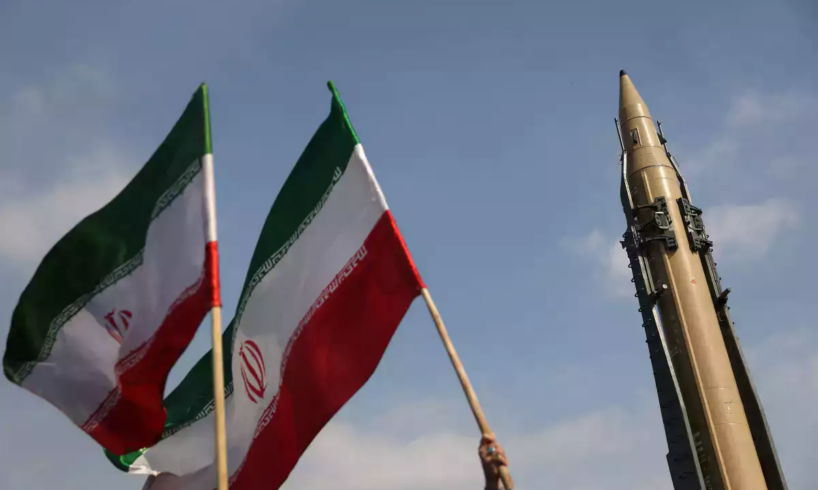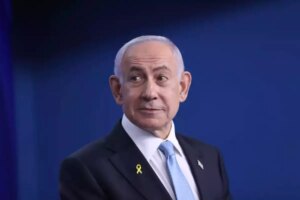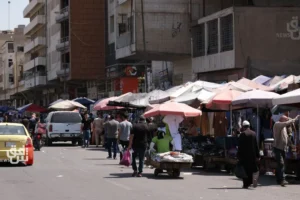
Kamal Kharazi, chairman of Iran’s Strategic Council on Foreign Relations, is one of the closest advisors to Supreme Leader Ayatollah Ali Khamenei. In an interview published last week on Khamenei’s official website, Kharazi laid out his vision of what he called “the primary threat posed by the Zionist regime to the world.”
Presented as a geo-strategic analysis, Kharazi’s remarks in fact revealed dangerous, classical antisemitism, cloaked in diplomatic language. His statements only proves the antisemitic nature of Iran’s regime, and offers another glimpse into the ideological justification Tehran promotes for the destruction of Israel.
Kharazi warned that Israel seeks to establish a “Greater Israel” spanning from the Nile to the Euphrates – a goal, he claimed, rooted in promises made in the Torah. He accused Israel of following a 24-point plan allegedly crafted by the Freemasons in a clear reference to The Protocols of the Elders of Zion, the notorious 19th-century antisemitic forgery that fueled persecution of Jews in Europe. Kharazi added that “the Jews are a small minority seeking to control the world,” thereby explicitly embracing the conspiratorial narrative of the “cosmopolitan Jew” pulling the strings behind global powers. His deliberate mention of the Freemasons was also no coincidence, reviving the old antisemitic myth that Jews secretly control this shadowy group, a theme common in late 19th-century propaganda promoting the notion of a global Jewish takeover.
Iran’s Supreme Leader Ali Khamenei Reuters, Gettyimages
A ‘just’ Jihad
Kharazi also likened Israel to the Islamic State terrorist organization, claiming that like ISIS, Israel too promotes “sacred violence.” This is a familiar dehumanizing tactic used in Iranian regime rhetoric, aimed at framing aggression against Israel and Jews as legitimate self-defense, even as a service to humanity. Tehran thus attempts to lend a moral veneer to its hatred of Israel, portraying the fight against it as a righteous jihad.
At a regional conference in Qatar this past May, Kharazi had already urged regional states to unite against Israel’s expansionist ambitions. Now, it seems that his remarks, widely disseminated by Khamenei’s English-language media arm, were intended not only for governments and peoples in the region but also aimed at leveraging the global surge in antisemitism since October 7, to draw broader Western audiences into Iran’s orbit.
These statements were no off-the-cuff remarks. Kharazi was quoted directly on the supreme leader’s official website, one of the regime’s top platforms for broadcasting carefully coordinated messaging both internally and externally. The conclusion is clear: Antisemitism is a central pillar in the ideological framework of the Islamic Republic. The religious justification provided by Khamenei and other regime figures for the October 7 massacre stems from this antisemitic worldview. Kharazi’s rhetoric helps set the ideological stage for another such atrocity.
In doing so, Kharazi joins a long list of Iranian officials, led by Khamenei himself, who have transformed “the Jewish question” into a political and propaganda weapon. Instead of criticizing specific Israeli policies, they adopt a religious-mythological narrative of a cosmic battle against the “Zionist entity,” which they view as a direct continuation of the biblical “Jew.” Even after Operation Shield and Arrow and the blow dealt to Iran’s axis of resistance in the 2023 Israel–Hamas war known as Operation Iron Swords, Tehran continues to pursue its vision of Israel’s annihilation. In his recent speeches, Khamenei reaffirmed this goal, effectively instructing his subordinates to redouble efforts toward its realization, especially in light of the disruption of their previous plan, stemming from a lack of coordination with Hamas leader Yahya Sinwar.
Iranian missiles on the background of a banknote of Iranian rials Getty Images
Riding the wave
While Iran publicly claims to distinguish between Jews and Zionism, it is actively laying the groundwork for yet another war crime in the mold of October 7. Israel must intensify its efforts on the international stage to expose and highlight the antisemitic discourse promoted by the Iranian regime. Such a campaign would undermine Iran’s legitimacy, shed appropriate light on the dangerous ideology it espouses, and bolster Israel’s international legitimacy in countering Tehran.
At the same time, Kharazi’s statements may also suggest the regime’s growing weakness, and its attempt to ride the wave of global antisemitism to muster support, both globally and regionally. The lack of regional response to his call in May, the blow suffered by Iran and its proxies in the war, and the broader upheaval in the Middle East that followed, including the rise of an anti-Hezbollah government in Lebanon, have led Tehran to once again play the antisemitic card, in an effort to compensate for its strategic setbacks and weakening position.





